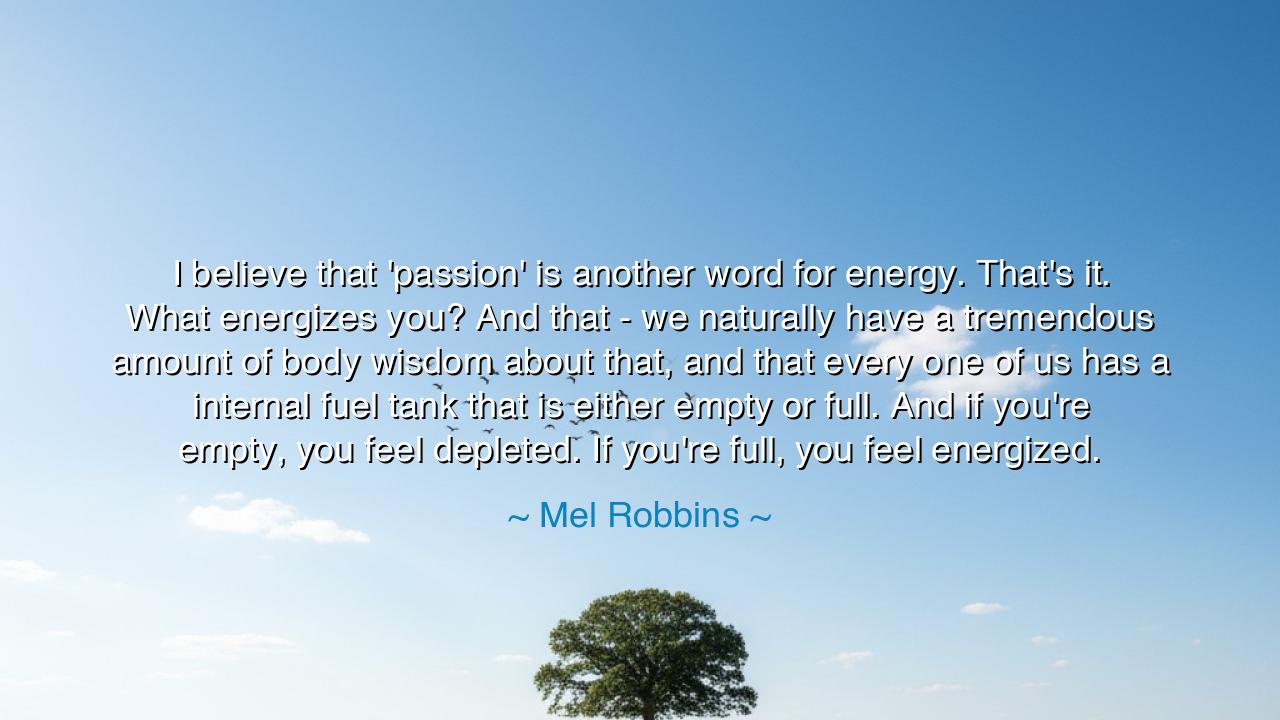
I believe that 'passion' is another word for energy. That's it.
I believe that 'passion' is another word for energy. That's it. What energizes you? And that - we naturally have a tremendous amount of body wisdom about that, and that every one of us has a internal fuel tank that is either empty or full. And if you're empty, you feel depleted. If you're full, you feel energized.






Hearken, O children of the ages, to the illuminating words of Mel Robbins, who speaks of the essence of passion as the vital force within every soul. She teaches that passion is none other than energy, the sacred current that drives thought, action, and purpose. To understand what energizes the heart is to touch the wellspring of life itself, for each of us carries an internal reservoir of strength, a fuel tank that must be tended, nourished, and filled with the pursuits that give spirit to existence.
Robbins reminds us that the body and mind hold profound wisdom, a silent guidance that knows what brings life and what drains it. When the internal fuel tank is empty, the soul grows weary, the spirit falters, and the mundane becomes burdensome. But when it is full, vitality surges, clarity sharpens, and the tasks of life are met with vigor and joy. To attend to this inner energy is to cultivate the foundation of passion, purpose, and enduring engagement with the world.
Consider the life of Leonardo da Vinci, whose unquenchable curiosity and tireless exploration filled his internal fuel tank with wonder and energy. He pursued art, science, and invention with a passion that seemed boundless, driven by the very force Robbins describes. His vitality, fueled by ceaseless interest and attention, allowed him to illuminate the ages, demonstrating that the harnessing of one’s internal energy transforms mere life into greatness.
Even in humble endeavors, the lesson remains. The farmer who rises with the sun, the teacher who inspires the young, the healer who tends to the sick—all who recognize what energizes them find that the fuel tank replenished allows them to give abundantly, without depletion. Energy, Robbins teaches, is the currency of effective action, and passion is the living proof that the heart responds to what is meaningful and sustaining.
O children of the future, carry this teaching in your hearts: seek what fills your internal fuel tank, honor what energizes you, and cultivate your body and spirit with reverence. Do not allow the tank to run empty in pursuits that drain, but fill it with actions, thoughts, and endeavors that awaken vitality. In this, life itself becomes luminous, purposeful, and imbued with the enduring power of passion.
If you desire, I can also craft a visual, ancient scroll-style presentation of this passage to capture the heroic, timeless, and deeply evocative essence of Robbins’ teaching on passion, energy, and the wisdom of the body.






UGUser Google
Mel Robbins’ insight into passion and energy got me thinking about how we often separate the two, when in reality they’re interconnected. But what happens when we feel like we’re giving all our energy to things that don’t truly energize us? How can we reevaluate what we’re passionate about in order to fill our 'tank' with the right things? Is it enough to just know what energizes us, or do we need to take proactive steps to keep that energy flowing?
HPHa Phuong
This quote makes me reflect on how often we overlook our own internal energy. Robbins describes this fuel tank concept in a way that feels almost intuitive, like we all have an innate sense of when we're running on empty. How can we tune into that more effectively, especially when society pushes us to keep going no matter what? Are there practices we can adopt to regularly check in with ourselves and prevent burnout?
GNNguyen Tran Gia Nhu
I love how Robbins connects passion with energy—it’s a simple yet powerful way to look at motivation. But it also raises the question: how do we maintain a full 'fuel tank' when life gets so demanding? Is it about finding balance, or is there a deeper, more personal connection to what energizes us? I wonder if we sometimes ignore the warning signs when our energy is low because we’re too focused on other responsibilities.
DANguyen Thi Dieu Anh
Mel Robbins’ perspective on passion being a form of energy really resonates with me. It makes me realize how important it is to listen to our bodies and recognize when we're feeling depleted or energized. But how do we consistently find what truly energizes us, especially in moments when we’re overwhelmed or burned out? Do you think we can cultivate the energy we need, or is it something that comes naturally when we're aligned with our true passions?